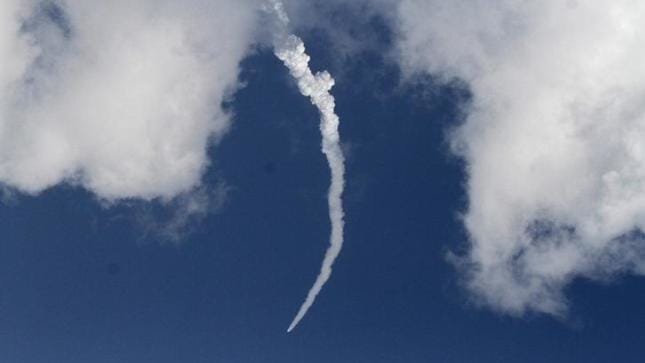
Former Indian Space Research Organisation (ISRO) chief K Kasturirangan talked about India's space scene and how it is bound to reach places in the coming future.
Kasturirangan said that Indian students can reach for the skies if inquisitiveness is provided to them. The interest in astronomy if is instilled in them right from the school days, the students can really go big in the field of space and astronomy.
Kasturirangan gives a thumbs up sign after the successful launch of the Geo-synchronous Satellite Launch Vehicle, or GSLV-D1 during a news conference in Sriharikota, on April 18, 2001.
"I think this is an extraordinary period of astronomy for India but what is important now is that we need to groom the younger generation to take an interest in astronomy, to bring them into astronomy and do justice to all the investments we are making," Kasturirangan said.
INTEREST IN ASTRONOMY AMONG THE YOUTH
Kasturirangan said that for India to be "right in the forefront" of astronomy, it is important for us to get the youth into astronomy and draw their interest in it.
The former ISRO chief also talked about the field being expanded with planetary explorations to grow further in the coming years. Making use of this prediction, the scientist said that there was a great scope for youngsters in the field of astronomy.
The PSLV-C11 (Polar Satellite Launch Vehicle), Chandrayaan-1 sits on the second launch pad of Satish Dhawan space centre at Sriharikota, about 100 km north of the southern Indian city of Chennai, on October 11, 2008.
Kasturirangan mentioned that there is a need to promote the astronomy among youth. For that, the government should promote activities right from the schools, in colleges as well as universities and other research areas.
"I think even areas such as planetary explorations will further grow. And so there is a lot of scope and a lot of excitement in this but the youngsters have to be motivated right from the schools. We should promote astronomical activities in the universities, research areas, institutions," he said.
We need a large number of youngsters from the university system, institutions, observational institutes.
- Kasturirangan
INDIA AND SPACE EXPEDITIONS
When Kasturirangan was asked about if India was capable of taking up space expeditions and research work on its own, he said that ISRO will need to partner with other nations after a certain point, even if India manages to reach that position.
I would say up to a point India is capable of taking up space expeditions single-handedly. But I think at a certain stage India must move towards international collaboration and cooperation.
- Kasturirangan
"Chandrayaan had six instruments from abroad and six from India... I am sure that future Mangalyan and other planetary explorations will have (collaboration). And afterwards I believe we will be a part of an international expedition to planetary exploration," Kasturirangan said.
Kasturirangan asserted on a fact and advised the government that India should not go in for loans to facilitate space research programmes.
We should not take loans because investments are very large and the resources can be very demanding.
- Kasturirangan
He talked about India demonstrating its capabilities in the field of astronomy.
"I don't think there is any reason why we should when the international community also looks to collaboration with India because Indians are easy to collaborate with, are capable and can contribute substantially to major programmes."
Underlining India's strong presence in international space programmes, the Padma Vibhushan awardee of 2000 predicted tremendous opportunities for the country in this field.
He referred to India's participation in the Thirty Metre Telescope (TMT) project, a proposed astronomical observatory, mentioned the Square Kilometre Array, a large multi radio telescope project and said India was a partner for the Laser Interferometer Gravitational-Wave Observatory (LIGO) to detect cosmic gravitational waves.
PSLV-C25/Mars Orbiter lift-off.
"I think others will come here and they will be partners here of an Indian-inspired thing. And may be tomorrow there will be an astrostat in which others will come and participate. So just look at the things we are doing. So I think there is tremendous opportunity and the international community is very much inclined to do this," he stated.
ISRO AND RESOURCES
According to a few reports, it comes to light that ISRO's resource constraint has continued to ground its human space flight venture.
AS Kiran Kumar, who retired as ISRO Chairman earlier this month, said that ISRO is working on some of the critical technologies for the human space flight, such as crew module and environmentally-controlled chamber but also mentioned how the space agency's priority continues to be strengthening its observation, communication and navigation capabilities.
(With inputs from PTI)